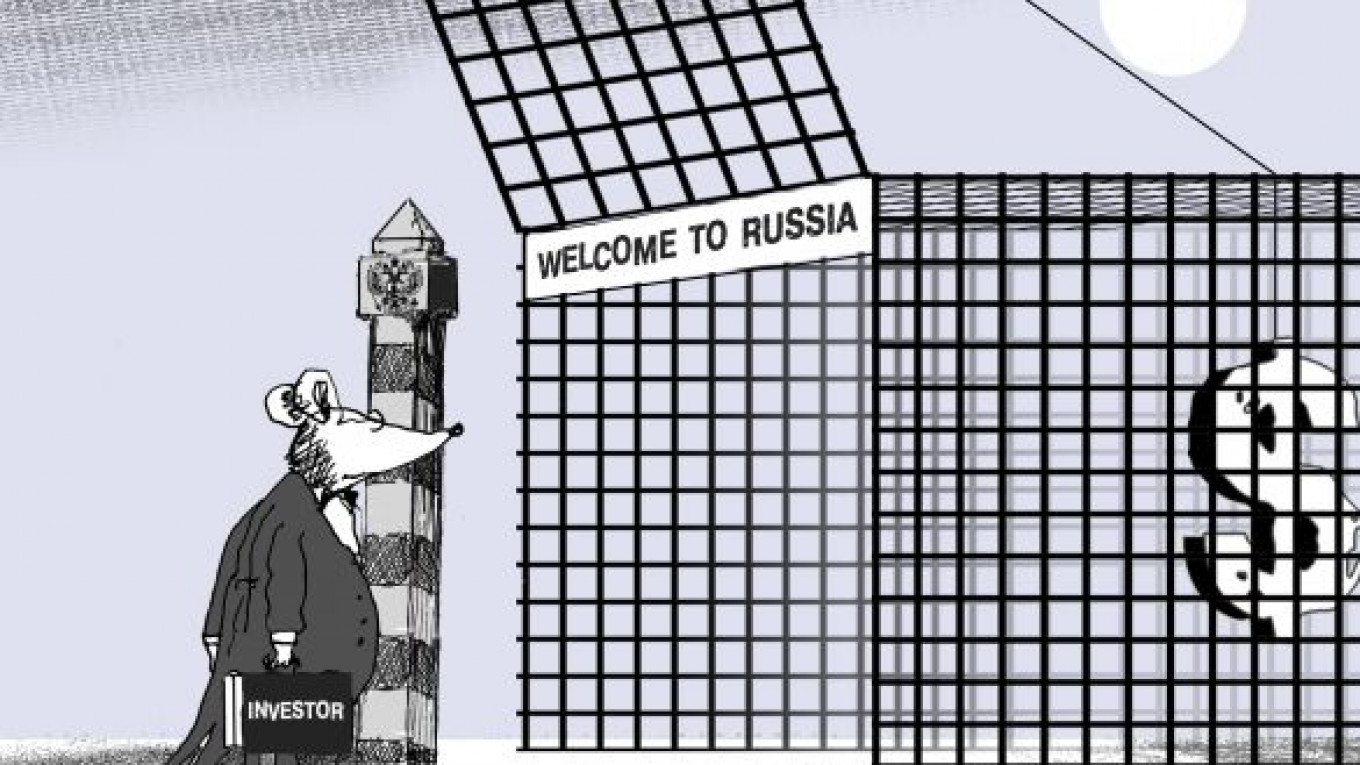Throughout October, Prime Minister Vladimir Putin has personally met with potential foreign investors to calm their fears about doing business in Russia. He has described Russia as an enormous market awaiting money and technology from developed countries. And that’s true: Russia is a huge and unique market with vast potential for modernization and the introduction of new technologies — and not just in the planned Skolkovo innovation hub.
We do need new standards and more efficient production. But how do we resolve the obvious problem of ensuring the safety of future investments? How can potential investors be guaranteed that the assets they create in Russia will remain theirs?
Without first resolving the situation for Russian businesses, there’s no way to attract foreign investors. It is impossible to trample domestic businesses while creating attractive conditions for foreign firms. Likewise, foreigners will only feel secure once Russia reforms its judicial system and passes legislation favorable to business. Raiders have attacked not only private property in Russia, but the entire judicial system. Property seizures of everything from individual plots of land and small buildings to major companies have become commonplace throughout the country.
Generally speaking, there are several clear categories of people ordering raids and actually conducting them. The people ordering the raids are, as a rule: a) monopolistic companies that seize ownership of independent businesses to swallow up their assets and neutralize any nascent competition; b) officials seeking property at practically no cost, which they then register in the name of a wife or other relative; c) former business partners who, lacking a legal tradition of civilized asset splits, opt to “eliminate their opponent”; or d) law enforcement agents who open criminal proceedings against businesspeople to coerce them into a forced takeover or as a means of confiscating goods or property that can be resold on the market.
State officials also go after entrepreneurs to punish them for not cooperating in corrupt schemes, which could mean interfering in the business or even initiating trumped-up criminal proceedings against the individual who refused to “cooperate.” Falsified evidence is widely used by the state to make its case, which is possible because of the complete absence of an independent judiciary. As a rule, judges at all levels side with the prosecution.
In many cases, rulings by corrupt judges are used to expropriate property and serve as the basis for future criminal proceedings against the targeted individual or company. The authorities conduct surprise searches of corporate offices and seize records for a criminal case in which the results are rigged in advance. Employees are interrogated and threatened with criminal charges unless they sign off on fabricated testimony to be used against their employer.
Criminal courts are not directly dependent on corrupt dealings, but it has been shown repeatedly that they are wholly subordinate to law enforcement agencies. Judges routinely rule in favor of the prosecution out of fear and an inability to make a decision differing from the position of the court chairman, who in turn takes his position from his superiors, and so on.
The general practice in Russian courts is to avoid acquittals at all costs. As a result, no weight is given to potentially exonerating evidence, motions by defense lawyers are denied, and witnesses for the defense are either never cross-examined or their testimony is discounted. The verdict usually does not take into account the position of the defense and is simply a copy of the indictment, written by the prosecutor when the criminal case was first opened.
The bureaucratic system is set up in such a way that any appeal against the actions of a representative of the state is sent to the very person against whom the complaint was lodged. For example, an appeal for a redress of wrongs sent to the prosecutor general is forwarded to the regional prosecutor’s office, which in turn hands it to the prosecutor named as the wrongdoer. That individual responds that all of his actions were justified and legitimate, which is then sent to the citizen who filed the complaint and back to the prosecutor general.
Of course, not all Russian businesses fall victim to this steamroller of extortion and intimidation. Some manage to work out a deal enabling them to survive, but at the cost of their independence.
Only a working system that can defend real owners’ rights — that is, an independent judiciary — will be able to attract investors to Russia. These problems are hardly new, but they are the ones that need to be solved before the country’s business climate can improve.
Yana Yakovleva is chairwoman of the Business Solidarity partnership, a pressure group for judicial reform and for defense of the rights of entrepreneurs. This comment appeared in Vedomosti.
A Message from The Moscow Times:
Dear readers,
We are facing unprecedented challenges. Russia's Prosecutor General's Office has designated The Moscow Times as an "undesirable" organization, criminalizing our work and putting our staff at risk of prosecution. This follows our earlier unjust labeling as a "foreign agent."
These actions are direct attempts to silence independent journalism in Russia. The authorities claim our work "discredits the decisions of the Russian leadership." We see things differently: we strive to provide accurate, unbiased reporting on Russia.
We, the journalists of The Moscow Times, refuse to be silenced. But to continue our work, we need your help.
Your support, no matter how small, makes a world of difference. If you can, please support us monthly starting from just $2. It's quick to set up, and every contribution makes a significant impact.
By supporting The Moscow Times, you're defending open, independent journalism in the face of repression. Thank you for standing with us.
Remind me later.






